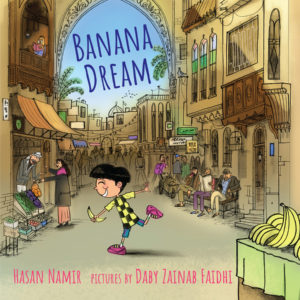“Learning Empathy, Compassion, and Self-Acceptance from Mooz”
I was born in Baghdad, Iraq and grew up there until I was 11 years old. I remember one time, I was seven years old, my father had just returned from Amman, Jordan, a neighbor country. His face was beaming with excitement. I could tell he had a surprise for me, my mom and my sister. I was waiting in anticipation when he revealed what he brought cross the border: bananas. I was so excited because we never had bananas in Iraq. After Saddam Hussein invaded Kuwait, the United Nations Security Council imposed sanctions against Iraq. What that meant was countries weren’t allowed to import food, fruits and vegetables into Iraq. Instead the U.N. would give monthly food basket for families that included wheat, flour, sugar, rice, milk powder, tea, salt, detergents, soaps, beans, lentils and cooking oil. The basket didn’t include any fruits, vegetables, meats. Sadly, bananas weren’t allowed to be imported to Iraq and also they weren’t locally grown. I grew up dreaming about bananas, and I would see the fruit only on television. When my father came back from Amman, he had brought bananas with him and I was so happy. I ate so much and I wanted to eat more of them. My mom said to take a breather and not overeat otherwise, I would get a stomach ache. I wanted to bring some bananas to school. My mom wouldn’t let me do that. She didn’t want other kids to see me with them.
As a kid, I had a lot of unanswered questions. I didn’t understand why my mama wouldn’t let me bring bananas to school. I quickly learned that not everyone was privileged to eat the fruit. Like my parents, I wanted to grow up to be more empathetic and compassionate.
In 1998, my family immigrated to Canada and I quickly noticed that bananas were plentiful and cheap. Every time I ate the fruit, I had memories of Iraq and how bananas weren’t imported locally. Things have changed in 2003 during the Iraq War. All the sanctions were removed. Bananas became plentiful. I was happy to see Iraqi children being able to eat the fruit. My heart was with all the children who lived through war-stricken Iraq.
For many years, I wanted to bring the story of bananas in Iraq to life. When my son Malek was born, I knew that I wanted to turn the story into a children’s picture book. As such, I wrote Banana Dream. The story is about Mooz, an Iraqi boy growing up in war-stricken Iraq. His name means Banana in Arabic and he dislikes his name because he feels left out, like an outsider, when all his cousins were named Ali and Mohammad. His classmates mock his name and make fun of him because he was named after a fruit and that was such a strange thing. Mooz was always curious about his name so he asked his mother about it. His mama tells him the story of his birth. After years of being unable to get pregnant, she dreamed that she was feeding a baby a banana. After she told Mooz’s father about the dream, he drove for hours to Amman, Jordan to find her some bananas, and soon after, Mooz was born. After hearing this story, Mooz’s perception of his own name changes for the better. He becomes proud of his name and even defends his classmates who mocked him once again. He has a new appreciation of his name. The story also highlights Mooz’s dream of eating bananas too after sanctions were removed after the Iraq war. I wanted to show the thrill and excitement of Mooz eating a banana for the very first time. It is the same feeling I was having when I had a banana for the first time. It was such a magical feeling.
I hope with Banana Dream, kids of all ages can learn to be empathetic and compassionate toward anyone who is not as privileged. I knew that I was writing a story about war so I treated it with extra sensitivity. I hope that the young readers will have empathy for Mooz as he goes through his journey of self-acceptance.
When I wrote this story, I wrote it for my son, Malek, because I want him to read Mooz’s story so he can he learn about the time when bananas weren’t grown in Iraq and they were only just a dream. I hope that Malek and all kids who read the book will have a new appreciation of the fruit. May the story bring joy to all readers and also may it remind them not to take anything for granted. This experience has helped me appreciate the little things in life that I otherwise would not have paid attention to.
Published July 11th, 2023 by Neal Porter Books
About the Book: A young boy in Iraq yearns to taste the bananas that have been made unavailable by warfare.
Growing up in Iraq after the Gulf War, Mooz didn’t always like his name, which means “banana”. But when he learns the story behind it, he’s proud, even when being teased by his classmates. Now all he yearns for is to taste a banana—a lofty dream in a time when few countries are trading with Iraq, where bananas don’t grow.
Inspired by author Hasan Namir’s own childhood, Banana Dream is at once a celebration of a seemingly ordinary fruit and a snapshot of how war can alter a landscape. Artist Daby Zainab Faidhi’s background in architectural illustration is evident as she brings the story’s setting vividly to life.
★ “This vibrantly illustrated picture book introduces children to the toll of war through a relatable experience: learning the meaning of one’s name. Mooz emerges as a fully formed, layered character, while the Iraq setting is richly drawn. The stylized artwork has an appropriately dreamy feel in places. What’s in a name? Plenty, as this clever and poignant tale makes clear.”—Kirkus Reviews, Starred Review
About the Author: Hasan Namir is an award- winning Iraqi-Canadian children’s book author. His debut picture book was The Name I Call Myself. He has also published books of poetry and a novel. He lives in Vancouver with his family.
Visit him online at HasanNamir.com
Twitter – @HNamir
Instagram – @Hasan.Namir
https://holidayhouse.com/book/banana-dream/
Twitter, Instagram, and Facebook – @HolidayHouseBks
Thank you, Hasan, for bringing us Mooz who will truly help readers grow!


